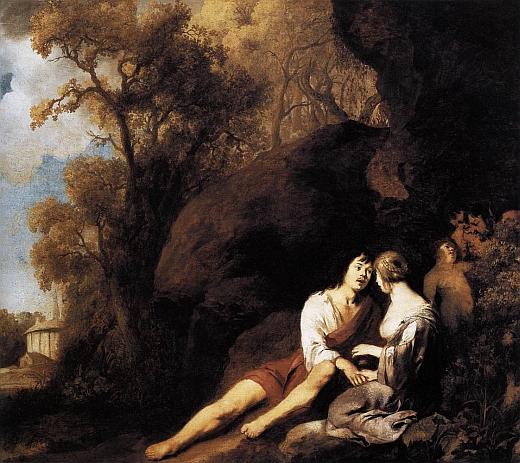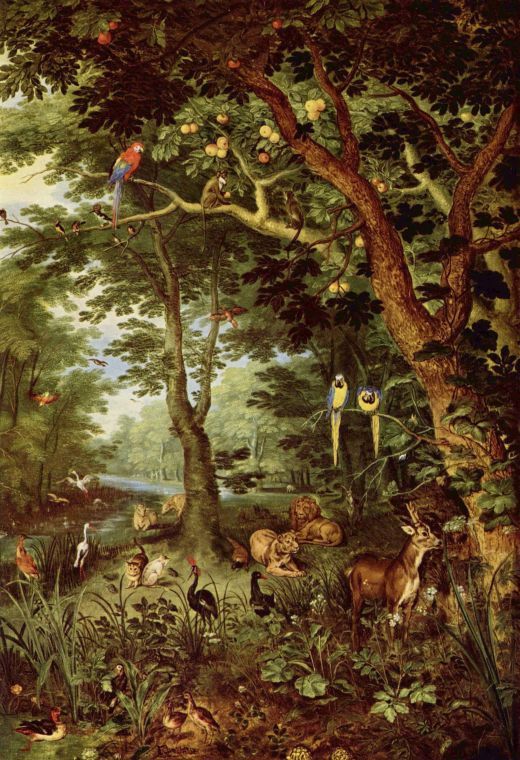
How vainly men themselves amaze
To win the palm, the oak, or bays ;
And their uncessant labors see
Crowned from some single herb or tree,
Whose short and narrow-vergèd shade
Does prudently their toils upbraid ;
While all the flowers and trees do close
To weave the garlands of repose.
Fair Quiet, have I found thee here,
And Innocence, thy sister dear!
Mistaken long, I sought you then
In busy companies of men :
Your sacred plants, if here below,
Only among the plants will grow ;
Society is all but rude,
To this delicious solitude.
No white nor red was ever seen
So amorous as this lovely green ;
Fond lovers, cruel as their flame,
Cut in these trees their mistress’ name.
Little, alas, they know or heed,
How far these beauties hers exceed!
Fair trees! wheresoe’er your barks I wound
No name shall but your own be found.
When we have run our passion’s heat,
Love hither makes his best retreat :
The gods who mortal beauty chase,
Still in a tree did end their race.
Apollo hunted Daphne so,
Only that she might laurel grow,
And Pan did after Syrinx speed,
Not as a nymph, but for a reed.
What wondrous life is this I lead!
Ripe apples drop about my head ;
The luscious clusters of the vine
Upon my mouth do crush their wine ;
The nectarine and curious peach
Into my hands themselves do reach ;
Stumbling on melons as I pass,
Insnared with flowers, I fall on grass.
Meanwhile the mind, from pleasure less,
Withdraws into its happiness :
The mind, that ocean where each kind
Does straight its own resemblance find ;
Yet it creates, transcending these,
Far other worlds, and other seas ;
Annihilating all that’s made
To a green thought in a green shade.
Here at the fountain’s sliding foot,
Or at some fruit-tree’s mossy root,
Casting the body’s vest aside,
My soul into the boughs does glide :
There like a bird it sits and sings,
Then whets and combs its silver wings ;
And, till prepared for longer flight,
Waves in its plumes the various light.
Such was that happy garden-state,
While man there walked without a mate :
After a place so pure and sweet,
What other help could yet be meet!
But ’twas beyond a mortal’s share
To wander solitary there :
Two paradises ’twere in one
To live in Paradise alone.
How well the skillful gard’ner drew
Of flowers and herbs this dial new ;
Where from above the milder sun
Does through a fragrant zodiac run ;
And, as it works, th’ industrious bee
Computes its time as well as we.
How could such sweet and wholesome hours
Be reckoned but with herbs and flowers!
—Andrew Marvell, The Garden (ca. 1660)
A wonderful, and not really well known or appreciated little gem from Marvell. In a sense it’s just a simple tale of a garden, of an amorous encounter, but then the suggestions build that of course it is the garden. Among the poems of the age of Milton (and Marvell stands in many ways right next to Milton himself), this one has a unique place. I am fascinated by its wandering perspective. Note how the narration builds, how the descriptions move through the garden, adding layers of nuance, imagery and sophistication. You can imagine the poet wandering through the garden and describing what he sees. He begins from simple premises and builds slowly towards a suspiciously theological message. This poem is in differing ways a forerunner of William Blake and of Voltaire. And suddenly the perspective of the poem ceases to be outward, the poet looks within (“The mind, that ocean where each kind/Does straight its own resemblance find”). This seems to me not the work of an extrovert, amiable poet, but of a complicated and introverted man who thinks himself misunderstood. A misfit perhaps. The garden is simply a country garden. And the garden is “paradise,” a word that etymologists tell us comes from an old Persian tongue meaning a garden with a walled enclosure. But Marvell is not giving us the lesson Milton would; he is not writing about the fall. He is giving us the address of his own private retreat. And Marvell’s garden is the final stop for one year of No Comment. Good-bye and best wishes.




